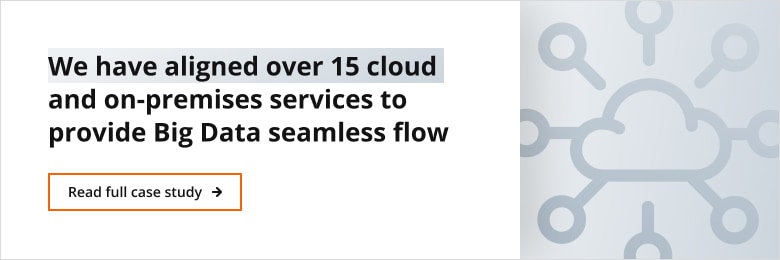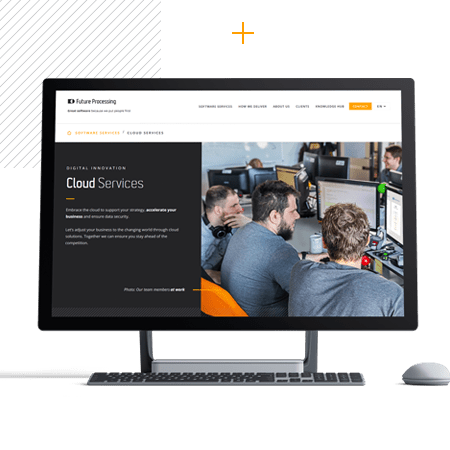
A complete guide to custom cloud computing
In the era of cloud computing, the question is not whether you should move to the cloud, but which cloud option you should select.
Because cloud adoption drives better businesses — it’s as simple as that.
Today, we’re going to take a closer look at some custom cloud solutions and the benefits that they offer over standard options. But — as usual — we’re going to start with the basics first.
What is custom cloud computing?
Simply put, custom cloud computing is a highly configurable cloud environment built from the ground up with a wide variety of features tailored to specific business needs and project requirements, both functional and non-functional.
For comparison, standard solutions provide more of a “one-size-fits-all” approach (with several variations to choose from). Either one of these options may be a good choice — it all depends on what you really need. The decision should be based solely on your expectations and… your budget, of course.
But if you want to find out whether custom cloud computing is a good choice for you, first you need to know what it involves.
What are the benefits of custom cloud computing?
- Flexibility
In a custom agreement with a cloud service provider, you can adapt the entire environment to specific project needs. And more importantly, you can even modify the details as time goes by and your requirements change. For example, you may want to scale up or down or simply improve the efficiency of your system architecture.
- Expert assistance
Reputable providers ensure that their clients receive round-the-clock support. This means that in case anything critical were to happen, you could still receive expert help, even at 2 in the morning. A chatbot or helpdesk on a traditional eight-hour shift shouldn’t even be an option here. Whatever issue you have — it should be handled at the very moment that you report it.
- Cloud security
With custom cloud solutions, you can secure your data with even greater flexibility and effectiveness. Cyber-theft preventative measures, data recovery options, compliance with the newest regulations — all of this is especially important when you work with very sensitive information (bank account details, patient records, financial reports, private passwords, and so on).
- Efficiency
Every well-customised cloud environment translates into greater ease-of use and better productivity for the entire team. Plus, it can be configured and deployed really fast, especially compared to in-house solutions.
- Cost-efficiency
This “benefit” is very controversial simply because custom cloud computing is more expensive than any standard option.
However, if you weigh the advantages against the costs — it may turn out that the potential benefits you reap will easily justify the price, making it worth every penny. It all depends on how the custom configuration influences the development process and your business as a whole.
Also, a solution like this often comes as a package; if you decide to go for it, you will need to hire an experienced expert or an IT partner, as well. One that can guide you through the process of picking the right cloud provider, help you face the challenges of cloud migration, and ensure optimal infrastructure configuration.
How to choose the right custom cloud provider for your business needs
Selecting the right custom cloud provider is not very different from choosing any service provider in general.
Here are the most important things that you need to take under consideration in any case:
- Security standards and data governance
Cloud service providers have to comply with certain industry certifications, such as ISO 27001. You need to find out which certificates are must-haves, and make sure that the provider you choose can provide you with the optimal mechanism for data governance, as well as continuous adherence to constantly changing regulations and standards. - Dependencies and partnerships
Look at which third-party services they use, and what kind of integrations they offer, in order to learn how your business can benefit. - Reliability
Find out how your potential cloud provider performs. See if they offer uptime and downtime monitoring and a reporting tool, how they handle downtime (both planned and unexpected), and whether they have mechanisms in place to deal with emergency situations, etc. - Technology
It is absolutely essential to make sure that your service provider keeps up with the latest trends and offers access to cutting-edge solutions.
And when it comes to a custom cloud provider, it’s especially important to check out:
- Costs
This is usually not something that you can easily glean from the provider’s website. You need to prepare a complete list of requirements, present it to potential vendors and get pricing options, as well as price simulations in case you scale up or down. - Customisability and manageability
Determine the provider’s real level of flexibility, and how easy or difficult the migration and configuration will be for your company. Plus, find out how much work it will take to manage the entire infrastructure and feel comfortable within the new environment. - Migration support and exit strategy
Ask whether you will receive all the assistance that you’ll need during the transition process in order to avoid a deadlock between your legacy infrastructure and the cloud-based one. Also, make sure that a detailed exit strategy is included in the agreement, especially in terms of data storage and access.
The future of your business is in your hands
This may sound like a cliché, but it’s actually the best conclusion that you can draw.
Nowadays, not only can you break free from your in-house servers, but you can also have multiple cloud services providers to choose from, offering plenty of solutions (both standard and custom), making it so that you can choose what works best for your business.
The final decision should be preceded by thorough research and a detailed analysis of your potential vendors, as well as your own needs and requirements.
If you need a well thought-out cloud strategy to help accelerate your digital transformation — don’t hesitate to contact us and ask for assistance.





